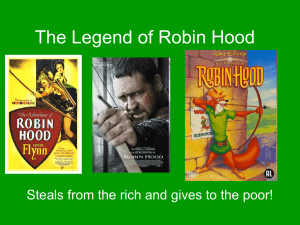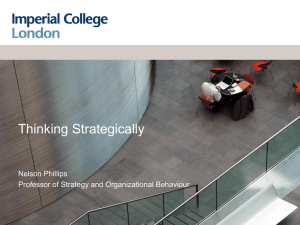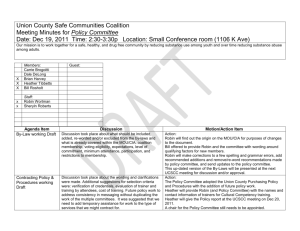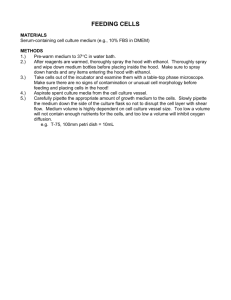THE BIG IDEA Simply put, the big idea behind the Robin Hood Tax
advertisement
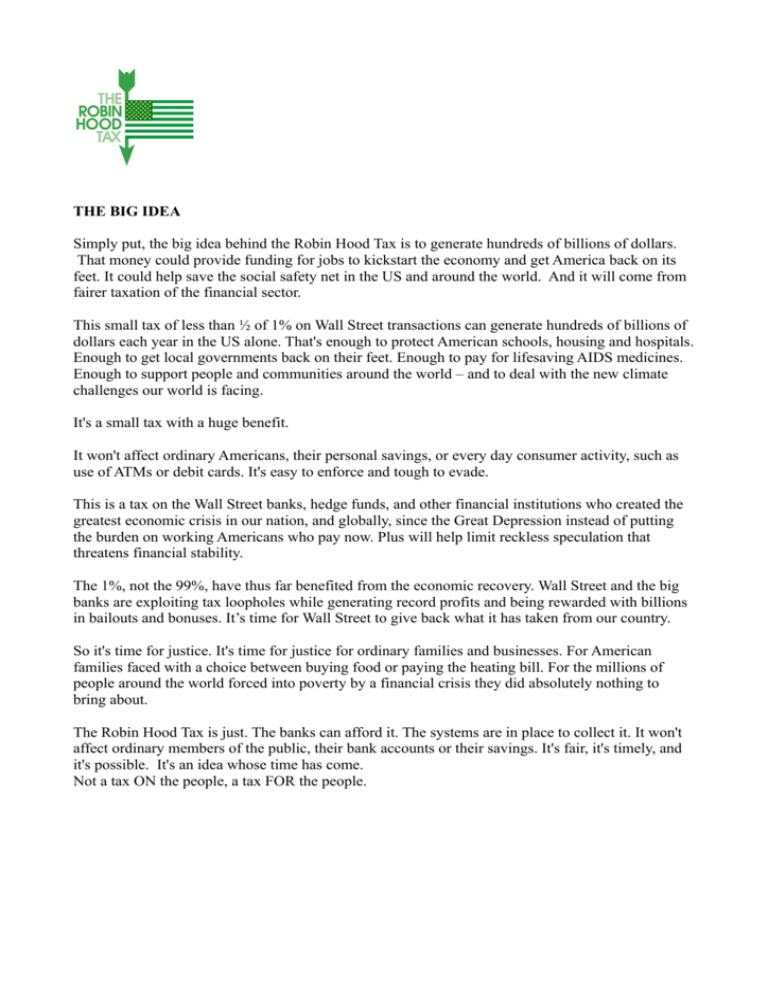
THE BIG IDEA Simply put, the big idea behind the Robin Hood Tax is to generate hundreds of billions of dollars. That money could provide funding for jobs to kickstart the economy and get America back on its feet. It could help save the social safety net in the US and around the world. And it will come from fairer taxation of the financial sector. This small tax of less than ½ of 1% on Wall Street transactions can generate hundreds of billions of dollars each year in the US alone. That's enough to protect American schools, housing and hospitals. Enough to get local governments back on their feet. Enough to pay for lifesaving AIDS medicines. Enough to support people and communities around the world – and to deal with the new climate challenges our world is facing. It's a small tax with a huge benefit. It won't affect ordinary Americans, their personal savings, or every day consumer activity, such as use of ATMs or debit cards. It's easy to enforce and tough to evade. This is a tax on the Wall Street banks, hedge funds, and other financial institutions who created the greatest economic crisis in our nation, and globally, since the Great Depression instead of putting the burden on working Americans who pay now. Plus will help limit reckless speculation that threatens financial stability. The 1%, not the 99%, have thus far benefited from the economic recovery. Wall Street and the big banks are exploiting tax loopholes while generating record profits and being rewarded with billions in bailouts and bonuses. It’s time for Wall Street to give back what it has taken from our country. So it's time for justice. It's time for justice for ordinary families and businesses. For American families faced with a choice between buying food or paying the heating bill. For the millions of people around the world forced into poverty by a financial crisis they did absolutely nothing to bring about. The Robin Hood Tax is just. The banks can afford it. The systems are in place to collect it. It won't affect ordinary members of the public, their bank accounts or their savings. It's fair, it's timely, and it's possible. It's an idea whose time has come. Not a tax ON the people, a tax FOR the people. SOME FREQUENTLY ASKED QUESTIONS WHAT IS THE ROBIN HOOD TAX? You'll have heard of Robin Hood. Took from the rich, gave to the poor. Looked a bit like Russell Crowe meets Kevin Costner. Well, the Robin Hood tax follows the same logic. Except for 'rich' read Wall Street, the big banks and investment [firms] houses. And for the 'poor' read everyone else, ordinary Americans, and the jobs, healthcare, education and infrastructure we all count on. This tiny tax of less than half of 1% a percent on financial sector transactions can generate hundreds of billions each year in the US alone—economists estimate as much as $350 billion. HOW DOES THE ROBIN HOOD TAX WORK? Basically, what we're after is a tax that raises hundreds of billions of dollars annually from the financial sector, to reframe our economy, stop austerity policies that are cutting public services, and help in the global fight against poverty, AIDS and other diseases, and climate change. We think the best way to do this is a Financial Speculation (or Transaction) Tax (FST/FTT). This is a tiny tax of less than half a percent on trades in derivatives, stocks, bonds, and foreign currency exchange. With an FTT, each time a financial product is traded, a tiny percentage (between 0.005% and 0.5%) of the value of the trade is collected in tax. You can think of it as a sales tax - the sort of taxes we all pay when buying clothes or other goods. In fact, for every $100 ordinary Americans spend on goods they pay $9.64 in taxes. What a Robin Hood Tax asks for is that when the big banks and investment funds are trading they pay a tiny tax of less than 50 cents on ¢$100 of trades. Surely not too much to ask? This type of tax is well-tested, cheap to implement and hard to avoid. In fact, there are already lots of different transaction taxes implemented by 40 countries, even a very limited one here in the US that funds the Securities and Trades Commission. They all work on the same principle: taxing every transaction a very small amount. We think there should be a lot more of them, particularly in areas not yet taxed, like currency transactions and derivatives. If we were to apply this broadly, it'd make the tax system a lot fairer. Importantly, transaction taxes are also good in that they would reduce the amount of the most risky transactions, the sort of gambling which helped to trigger the financial crisis. It is this sort of speculation that drove the economic crisis and pushes up gas and food prices in the U.S. and around the world. WHY DO WE NEED ROBIN? The financial crisis, started on Wall Street, and the Recession that followed, have left a massive hole in our economy, and resulted in the loss of jobs, homes, and devastating cuts in public programs. Many other developed and developing countries face a similar struggle. So our merry band of Robin Hood supporters believe that banks, hedge funds and the rest of the financial sector should pay to clean up the mess they helped create and to make Wall Street begin to pay it's fair share in tax. WHAT COULD THE MONEY PAY FOR? The financial crisis and recession have left a massive hole in the US’s public finances, hitting front line services, jobs and homes. The largest recession of a generation has had a disastrous impact in the US, driving millions into poverty and put many more at risk. Around the world it has pushed more than 2 million people below the $2 a day poverty line. We’re calling for a Robin Hood Tax on Wall Street to generate hundreds of billions of dollars every year in needed revenue for Main Street. The money raised will generate jobs and strengthen public services like health care, education and infrastructure at home while tackling AIDS, global health, poverty and climate challenges around the world. It’s time to stop talking about what to cut and start talking about how to invest in our future. In the US here's what an amount like that could achieve: Fund an additional 9 million jobs, reducing unemployment by a whopping 60%. Save more than 1.75 million homes from foreclosure Ensure that 41 million families have the healthcare they need and aren’t pushed into bankruptcy. Around the world: The consequences of the financial crisis have been serious in the US but they have been even worse in more vulnerable countries that did nothing to cause it. Just a small portion of the hundreds of billions from a Robin Hood tax could change many people’s lives forever: $6.5 billion puts every child on earth in primary school $6 billion gets all those in need on AIDS treatment and puts us on track to literally end the AIDS crisis globally. Climate Change + Green Jobs A tragic parallel between climate change and the financial crisis is that those least responsible suffer the most. While rich countries and powerful corporations, many with ties to the financial sector, have produced most of the greenhouse gases that are causing climate change, poorer countries are expected to bear 75-80% of the costs in adapting to these. $ 2 billion could pay for 1333 wind turbines to provide clean energy. $11 billion could pay for the whole of Haiti to adapt to flooding WHY TAX THE FINANCIAL SECTOR? Because it's responsible for a big part of the mess we're in. Because it has an obligation to all of us to help clean it up. Because it is the most profitable industry on earth. Because it is historically under taxed - so it can afford to pay a little more. Because the financial sector has returned to record profits and bonuses. Because the amount of money transferred from the American public to the financial sector adds up to the biggest resource transfer in U.S. history. Because the revenue that went to the Wall Street bailouts could have helped Main Street communities with public investments in infrastructure, healthcare, education, housing, and the green economy, critical resources that could have mitigated the effects of the worst economic crisis since the Great Depression. Because a Robin Hood tax on Wall Street spent in Main Street communities would have a ripple effect in expanding the national economy through productive investment. Because the IMF and many other financial commentators believe that the financial sector is under taxed, and has grown to become dangerously large and destabilising for the global economy, as we saw when the crisis hit in 2008. A Robin Hood Tax would discourage the riskiest of these casino transactions. Because it's time for the financial sector to make a greater contribution to the society it serves and benefits from. DOESN’T THE FINANCIAL SECTOR MAKE AN IMPORTANT CONTRIBUTION TO OUR ECONOMY? A safe, locally accountable, and healthy financial sector is essential to our economic prosperity as it provides necessary credit to small businesses and individuals and provides main street banking services. But this tax will have minimal impact on the majority of the financial sector. Certainly it will not affect retail banking, which includes savings and mortgages. It will instead introduce a micro-tax on short-term, casino-style trading which employs a small number of highly paid bankers on Wall Street and in hedge funds, not the tens of thousands employed in Main Street financial services. Unfettered by regulation, a distinct area of the financial sector – namely casino-style trading, the worst of which is the high frequency trading – has grown out of control. Studies show that a Robin Hood Tax would shrink this market - an area that has grown again to be even bigger than it was before the crash. By taxing this area of business we can raise much needed revenue and help to rebalance our economy away from our over-reliance on Wall Street. CAN THE FINANCIAL SECTOR AFFORD TO PAY HUNDREDS OF BILLIONS EXTRA? In a word, yes. It is the most profitable industry on earth, twenty eight times more profitable than the oil or gas industry. As the International Monetary Fund (IMF) and others have noted it is also historically under-taxed. From 1929 to 2010, the finance sector totalled more than $22.4 trillion in profits, according to the Institute for Health and Socio-Economy Policy (IHSP). It now accounts for more than 30% of all corporate profits, more than double its levels in the 1980s. To top it off, this same sector benefited from the largest bailout in U.S. history, ranging on, by some accounts from $7 trillion to over $20 trillion. It's now time for them to start paying society back. With their disproportionate dominance of the finance sector, the giants, the 'too big to fail' crowd, would pay the largest amount of the modest Robin Hood taxes. WON’T THIS AFFECT ORDINARY INVESTORS? In a word, no. The tax would have little or no effect on individual investors, and would not apply to normal consumer activity. In fact most proposals would exempt small investors entirely since we aren’t the ones making billion dollar trades every few minutes. The tax rate of the Robin Hood Tax (FTT) is set extremely low (ranging from 0.005% - 0.5%) precisely to avoid having an impact on pensions and savings that carry out transactions infrequently. Instead, it will impact on the other extreme of the banking spectrum – the hedge funds, casino style speculative banking and high frequency trading. An unrestrained financial sector has already knocked billions from the value of people's hard earned pensions – something a Robin Hood Tax could help avoid happening in the future. A Robin Hood Tax would hit casino-style investment banking and not the transactions of small businesses, many of whom already face huge charges, often of many per cent, for using bank services. It would help rebalance our economy away from an over-reliance on speculative trading and fast money to the real economy – helping to ensure banks serve businesses and not the other way around. WON’T BANKS JUST PASS THE COSTS ON TO CUSTOMERS? No, because financial transaction taxes are targeted at casino banking operations they can easily be designed in a way that protects the investments of ordinary people and businesses. Traders can also be legally barred from passing on costs to consumers. The IMF has studied who will end up paying transaction taxes, and has concluded that they would in all likelihood be ‘highly progressive’. This means the richest institutions and individuals in society would pay by far the predominant amount of the tax, in a similar way to capital gains tax. This is in contrast to sales taxes, which fall disproportionately on working people and those with the lowest incomes. Just like other taxes, specific exemptions and punitive measures can be built in to protect, for example, lending operating capital to businesses. WON’T COMPANIES JUST AVOID THE TAX OR MOVE THEIR BUSINESSES OFFSHORE? This is a common misperception, one that is promoted by those from the financial sector who oppose the Robin Hood tax. The short answer is no. As the IMF says, financial transaction taxes (FTTs) 'do not automatically drive out financial activity to an unacceptable extent.' The highly automated and centralised nature of many financial transactions and design of a Robin Hood tax (or Financial Transaction tax to use the technical term) means it would be very hard to avoid, and easy to collect. More than 70% goes through computerised central clearing houses meaning the tax would be very easy to monitor and very difficult to evade. This tax is not just a great idea, it's a brilliant reality. The mechanism of a Robin Hood Tax (financial transaction tax) has been place of decades in more than forty countries around the world including the UK, Brazil and Japan. There are many reasons banks would not leave the US, not least that they need a big enough government that they know will bail them out if things go wrong. There are not many governments with the ability or willingness to provide this implicit guarantee, certainly the Cayman Islands or even Switzerland isn't going to bail out Bank of America. Time zones are critical for financial transactions. This means that banks and other financial institutions cannot all move to Switzerland or Hong Kong. Additionally, relocation of a big bank itself would be very expensive and is highly unlikely just to avoid a small tax. CAN THIS WORK WITHOUT GLOBAL AGREEMENT? In a word: yes. In fact they have been introduced on a temporary or permanent basis over many decades in some 40 countries, including the fastest growing economies in the world, without driving business away. The best example of this is in the UK, where there is a financial transaction tax on share transactions. The UK’s major competitors do not have this and there certainly is no global agreement, yet it is a successful FTT that raises around $4.7 billion each year without a significant loss of business from the UK. London remains one of the biggest stock markets in the world. CAN A ROBIN HOOD TAX REDUCE SPECULATION AND RISKY FINANCIAL ACTIVITY? In recent years there has been an explosion in high frequency trading – thousands of transactions happen every second via computer algorithms. There has also been a huge increase in derivatives, making the volume of financial transactions increase to more than 70 times the size of the world economy. Many serious commentators believe this volume is dangerously large and destabilizing, and that many of these transactions are socially useless. Many of the most speculative, risky and socially useless transactions are based on very small profit margins, meaning that even at the very low tax rates we propose, a Robin hood Tax would shrink the size of the market by reducing the profitability of the most risky transactions. These are among the reasons why more than a 1,000 economists, including a number of Nobel laureates, support the Robin Hood Tax. At the Robin Hood Tax Campaign we are principally supportive of an FTT because of the money it will raise to help repair the U.S. and global economies. However, if it also acts to reduce risky gambling and make the world economy safer that can only be a good thing. ISN’T THE IDEA OF A ROBIN HOOD TAX FOREIGN TO THE U.S.? No. The US had a financial transaction tax (the mechanism of the Robin Hood tax) for half a century, from 1914 to 1966. Even the alternate name for the Robin Hood tax is named after an American, James Tobin, a U.S. economist who served on the White House Council of Economic Advisors and won the Nobel Prize in 1981. He proposed a tax very similar to the current proposal—though at an even higher rate to stop dangerous transactions. In the aftermath of a 1987 U.S. stock market crash, then Democratic House Speaker Jim Wright introduced a proposal for an FTT for the U.S. stock market at 0.5 percent, the same percentage we propose today. The proposal had broad bi-partisan support from among others, President George H.W. Bush’s Treasury Secretary Nicholas Brady and Director of the Office of Management and Budget Richard Darman. Let’s bring the Robin Hood tax, to life in the U.S. today.




